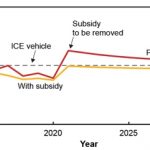39% of greenhouse gas emissions in the transport sector comes from heavy-duty trucks. Commercial batteries struggle to deliver enough power to make electrification feasible for heavy-duty applications. Rebecca Martineau at NREL explains how a working prototype, developed with the heavy machinery manufacturer John Deere, is now getting a 378% increase in power density. The key to the innovations rests on a state-of-the-art thermal management … [Read more...]
Next German government’s climate and energy plans: what will Olaf Scholz do?
Olaf Scholz led Germany's Social Democrats (SPD) to an unexpected win in the 2021 elections held in September. He now needs to finalise a coalition with the Green Party and the pro-business FDP before forming a government and becoming chancellor. Like his predecessor Angela Merkel, Scholz has said he wants to become a "climate chancellor". Kerstine Appunn and Benjamin Wehrmann at Clean Energy Wire try to understand what his climate and energy … [Read more...]
Nanochemistry breakthrough could lift energy density of batteries by factor six
Finding new ways for batteries to increase the charge they can store will lift their energy density. Researchers at Stanford University have developed an alkali metal-chlorine battery that stores six times the charge of today’s commercially available lithium-ion batteries. Until this breakthrough, a high-performance rechargeable sodium-chlorine or lithium-chlorine battery has been impractical because chlorine is too reactive to convert back to an … [Read more...]
Giving car manufacturers e-fuel credits will slow the rise of EVs
Transport & Environment (T&E) explains why e-fuel credits should not be included in the EU’s CO2 standards for new cars. If they are, it would give carmakers the option to claim an ICE vehicle as low- or zero-emission. But carmakers have no control over what fuel their customers put in their cars, making the regulation impossible to monitor. That opens the door to double-counting emission reductions with other existing regulations (Fuel … [Read more...]
Can Aluminium-air batteries outperform Li-ion for EVs?
Aluminium-air (Al-air) batteries for cars are an innovative technology that automakers and policy-makers should take a close look at, say Helena Uhde and Veronika Spurná at ECECP. Although a battery, they behave more like an engine: the fuel is the aluminium which reacts with the air via an electrolyte to produce electric power. Al-air has big advantages over a lithium-ion battery, the favoured choice for EVs. It has a travel range similar to … [Read more...]
EU “Fit for 55”: how it impacts the EU ETS to accelerate emissions reductions
Christoph Kellermann, Lun Zhou and Simon Göss at Energy Brainpool explain how the EU’s new “Fit for 55” proposals, released in July, will impact the EU Emissions Trading Scheme (EU ETS), hailed as one of the most effective ways of reducing emissions. The authors cover the changes to the existing ETS, the planned new ETS for road transport and buildings, the controversial Carbon Border Adjustment Mechanism (CBAM), and the new CO2 standards for … [Read more...]
We’re not costing energy correctly: reward clean energy optimisation, not maximum generation
Laura Sandys at Energy Systems Catapult says policy makers today are too focussed on rewarding clean energy generation, in other words supplying as much energy as possible. With that comes a focus on reducing the cost of the energy generated. But how about reducing demand? Demand optimisation should be equally rewarded: efficiency, non-generation demand management (even at the household level: think EVs and heat pumps), and any assets that … [Read more...]
EU: Slow-moving CO2 targets for cars put EV battery boom at risk
Europe’s battery manufacturers are positioning themselves to be global leaders. Their project pipeline will be enough to power a new European car fleet that is 75% battery-electric by 2030. That’s 38 European gigafactories by 2030 (fully funded, part-funded and proposed), €39.5 billion worth in investments, creating 44,000 direct factory jobs. But existing CO2 emissions cut targets imposed on car manufacturers – a leading driver of demand for … [Read more...]
China’s energy system: record renewables expansion, but coal still dominates
Lara Dombrowski and Simon Göss at Energy Brainpool give the latest headline figures for China’s energy system. In 2020 electricity generation in China went up by 298 TWh – an increase equal to 60% of Germany’s total. That year, renewables capacity increased more than ever before. That made China responsible for nearly 50% of global renewable capacity additions. But China has higher CO2 emissions than all the OECD countries combined. And continued … [Read more...]
Norway an EV role model? Their pathway is expensive and paid for with oil & gas exports
Norway is an EV leader thanks to a generous pot of tax incentives. Today, battery-electric cars make up more than half of all new car sales in Norway. Schalk Cloete takes a detailed look at what those incentives cost, and how many tonnes of CO2 they avoid. In short, Norway – a major oil and gas exporter - needs to sell over 100 barrels of oil (which emits 40 tonnes of CO2) to pay for the tax breaks it gives EVs to avoid one tonne of CO2. And … [Read more...]
What patents tell us: which countries, what sectors, are the clean energy innovators?
Today’s solutions cannot give us a successful transition on their own. That’s why the innovations coming down the pipeline are so important. One way to measure what, and who, is innovating is to look at the number of patents being filed for low carbon energy (LCE), explains Sean Fleming writing for the World Economic Forum. He summarises the latest report from the European Patent Office and the IEA, “Patents and the energy transition: Global … [Read more...]
EU’s new 15% emissions cut for EVs looks like 2% thanks to four “allowances”
EU regulations for reducing car emissions have been an important driver for getting European manufacturers to go electric and seek a leading position globally. But new rules will slow that progress, according to Transport & Environment (T&E). What look like rules that require a 15% reduction in CO₂ emissions from new cars from 2025 can mean a drop of as little as 2%, thanks to four “allowances”. Heavier average car weight (and electric … [Read more...]
18 energy transition scenarios to watch: where they agree and disagree
A wide range of regions, nations and respected organisations have created net-zero strategies and pathways, but on what do they agree and disagree? Dolf Gielen, Asami Miketa, Ricardo Gorini and Pablo Carvajal at IRENA have done a meta-analysis of 18 recent energy transition scenarios to find out. There is consensus over the main strategies: renewable power generation, and the direct and indirect electrification of end-use sectors – these account … [Read more...]
U.S. EV transition means major shake-up of car makers, hubs, jobs, dealerships, gas stations
General Motors (GM), in the past considered the measure of U.S. economic health, is retrenching to become an EV leader, writes Paddy Ryan at the Atlantic Council. CEO Mary Barra even wants people to think of GM as a tech company. Loss-making divisions have been shed and tech investments made. Rivals - from Tesla to pure start-ups - are forcing all car makers to face up to the electric future. But the disruption will go much further, explains … [Read more...]
China’s car sales target: 40% EVs by 2030 will cost CNY 100bn/year (€13bn, $15bn)
By the end of the 2020s China will phase out EV subsidies and instead rely on a mandate imposed on manufacturers to target 40% of car sales being electric by 2030. Nancy Stauffer at MIT reviews a study that estimates the new rules will result in 66m EVs sold in China in the next 10 years. That will move EVs well into the mainstream and have global consequences. According to the study, the total cost of that transition will be 100bn yuan/year … [Read more...]
- « Previous Page
- 1
- …
- 5
- 6
- 7
- 8
- 9
- …
- 12
- Next Page »















